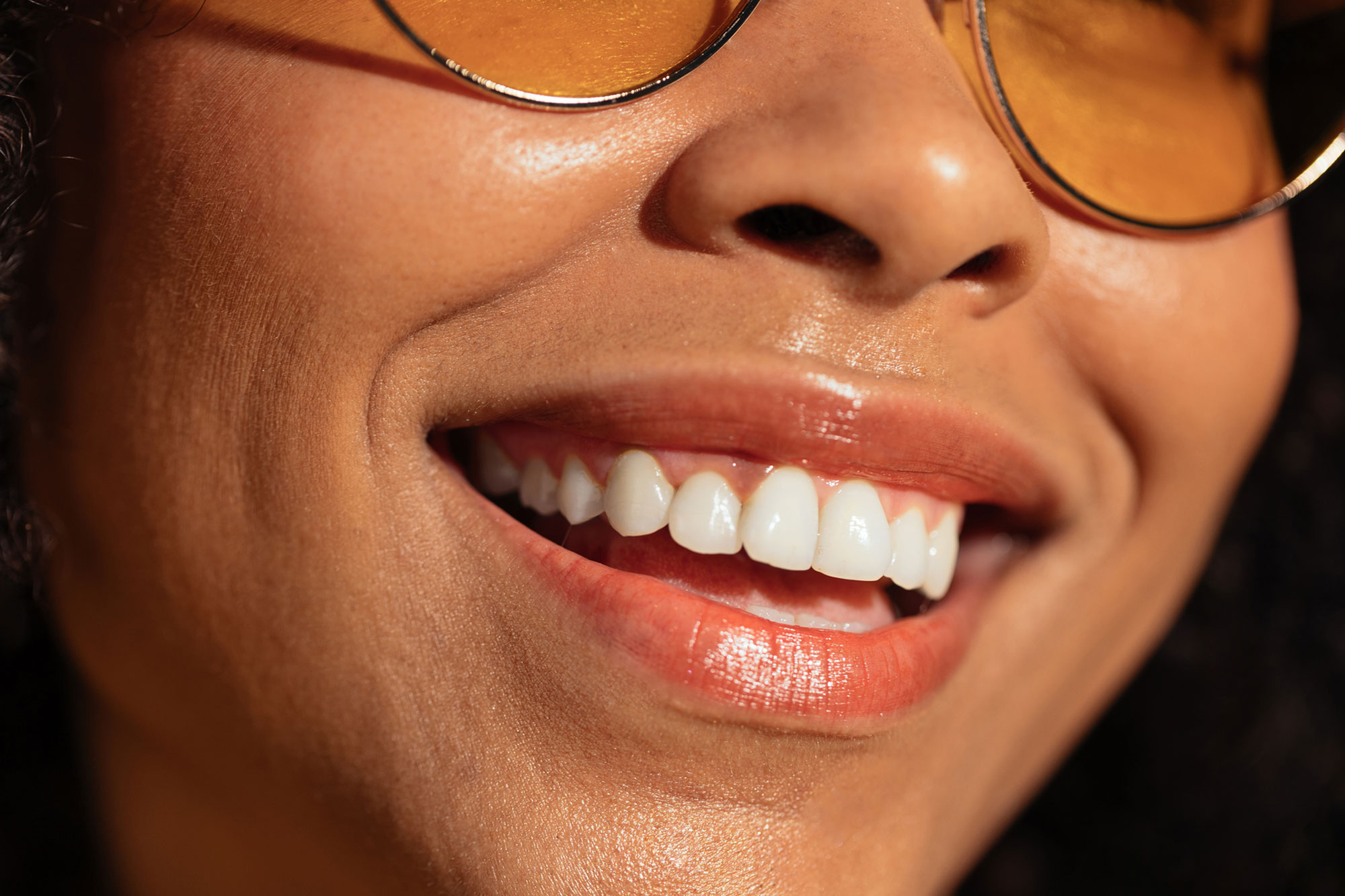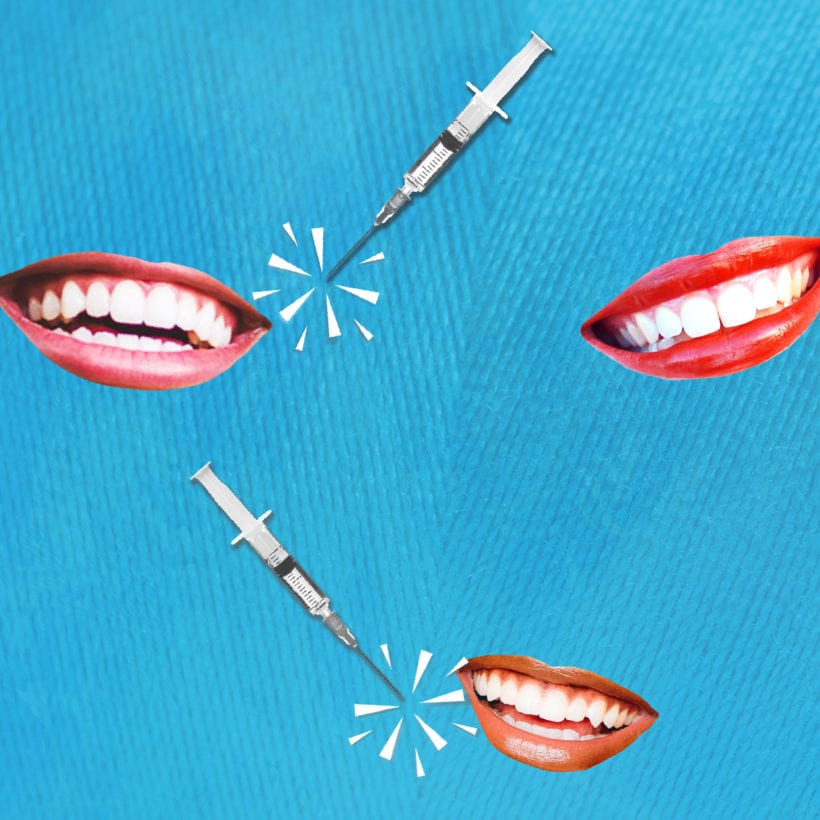I started taking an SSRI (selective serotonin reuptake inhibitor) antidepressant called Lexapro for my anxiety and obsessive-compulsive disorder in my early 20s. Over the next few years, I stopped and re-started medications after facing stressful surgeries and fertility issues (among other things.) But it wasn’t until my late 20s, when I had restarted on Lexapro and moved in with my boyfriend, that he told me I grind my teeth at night. I thought nothing over it at first, but over time, I noticed my jaw hurt, my neck hurt, and I had this feeling of swollen glands. (Though it wasn’t my glands, it turned out it was pain from the muscles right underneath where my ear meets my jaw.)
I bought an over-the-counter night guard and otherwise tried to ignore the issue. Then, a little over a year ago, I woke up in so much pain, unable to open my mouth more than a quarter of an inch. After an emergency trip to the dentist, I was diagnosed with SSRI-induced bruxism – teeth grinding caused by antidepressants. Yet, when my psychiatrist first presented me with SSRIs as an option, this particular side effect was never mentioned. In general, bruxism is when you grind or clench your teeth and jaw without intention. So, SSRI-induced bruxism is exactly that – when you clench or grind your teeth unconsciously due to being on SSRI medications.
Since coming off my antidepressant wasn’t an option in order for me to preserve my mental health, I tried to find relief through a professionally fitted nightguard. I also tried Botox, facial massages, and muscle relaxers, and still, the problem persists. Desperate for answers and to be pain-free, I turned to Dr. Michael Gulizio, DMD, MS, who specializes in complex dental problems and TMJ treatment. He clearly explained exactly what SSRI-induced bruxism is, the options available for those who suffer from it, and he helped me fully understand my case and treatment options, too. Here’s what I learned:
Meet the Experts
Dr. Michael Gulizio, DMD, MS is the program director of the New York University Continuing Dental Education Advanced Esthetics & Occlusion.
Do SSRIs cause bruxism?
In short, the answer is yes — SSRIs can cause bruxism, but it’s a bit different than “standard” bruxism. According to Dr. Gulizio, “SSRI-induced bruxism is an adverse reaction to some antidepressant medications (Fluoxetine or Sertraline) that typically occurs two to three weeks after starting the medication. It is different than general bruxism because it is medication-induced, while general bruxism typically occurs due to biting imbalances, tooth positions, and TMJ problems.”
What are the treatments?
First things first, it’s important to determine if your jaw issues are, in fact, SSRI induced. Dr. Gulizio says the first course of treatment should involve a thorough bite analysis to establish whether there are imbalances in the system — your teeth, bite, and TMJ (temporomandibular joint). “Depending on that analysis, orthodontics or Invisalign may be indicated, or, if there are no imbalances, a nightguard can be implemented. Additional treatment with Botox injections helps as well,” he explains.
After a thorough analysis that included impressive imaging and a computerized scan of my teeth, jaw, and bite positioning, it was determined that my bruxism had more to do with my anatomy and less with my medication. It turns out, I have real bruxism, and though my SSRI could compound it, it is not to blame.
In my case, I had some success with neurotoxin injections like Botox, but they only offer a temporary fix and can be expensive to maintain. So this time, Dr. Gulizio recommended a splint — similar to a nightguard, something I can wear at night and helps to more evenly balance the pressure points within my bite and jaw muscles. I decided to go that route since it sounded more therapeutic and effective. So far, we’re three months in, and I am truly noticing an improvement. Especially how my jaw feels and looks in my new “resting” position, and I’m waking up with far less tension and pain.
What are the negative effects of bruxism?
With bruxism, whether induced by your SSRI medications or occurring on its own, Dr. Gulizio warns that “teeth can chip, fracture, and break altogether, sometimes requiring removal of the tooth and placement of a dental implant.”
Because of the force you exert when you grind and clench, your teeth are also subject to excessive wear and cavities.
When should you see a specialist?
Dr. Guglizio advises, “If you wake up with discomfort in the muscles of your face, pain or sensitivity in your teeth for no other reason, or if your sleeping partner tells you that you are grinding your teeth while you sleep, it is time to see a dentist.” Signs of bruxism can include soreness, sensitivity, jaw tightness, facial pain, neck pain, headaches, and more.

Fortunately, treatments can help. Unfortunately, it isn’t likely that SSRI-induced bruxism will naturally go away on its own, although it can occasionally. “It’s different for everyone,” Dr. Gulizio explains, adding, “Recent studies have shown that adding the antidepressant Buspar (Buspirone) may relieve the symptoms.”
What to consider
There’s often some confusion or misdiagnosis surrounding jaw tension and jaw problems like teeth grinding, so it’s important to know distinguishing characteristics.
According to Dr. Gulizio, bruxism, or being diagnosed with “TMJ syndrome” or temporomandibular joint dysfunction, has been too often correlated with stress. “While there is a component of stress that can exacerbate bruxism, usually the cause is due to an unstable TMJ. If the TMJ is not seated in its “orthopedically stable” position within our skull, the muscles that move our lower jaw begin the tighten and tense up,” he explains.
Sleep is where the issue becomes most problematic since, you’re often unaware of what’s going on. “During the day while we are conscious of our jaw position, this typically isn’t an issue; however, when we are transitioning into the dream state during the sleep cycle when our brain is going into a delta wave pattern, the tension in the jaw muscles that was built-up during the day begins to release, and this release manifests in bruxism (grinding or clenching).”
Sometimes, Dr. Gulizio will even ask patients to undergo a sleep study to “evaluate whether or not they are bruxing and also to evaluate if the patient has sleep apnea.”
If you are struggling with any symptoms of jaw tension or pain or have been told you grind your teeth in your sleep and you are currently taking a prescribed SSRI, it’s time to see a dentist. They can help you find out if you have bruxism or TMJ issues, better determine the underlying cause (if it is your medication or another dental or orthodontic problem) and help you find solutions and relief.
We only recommend products we have independently researched, tested, and loved. If you purchase a product found through our links, Sunday Edit may earn an affiliate commission.








